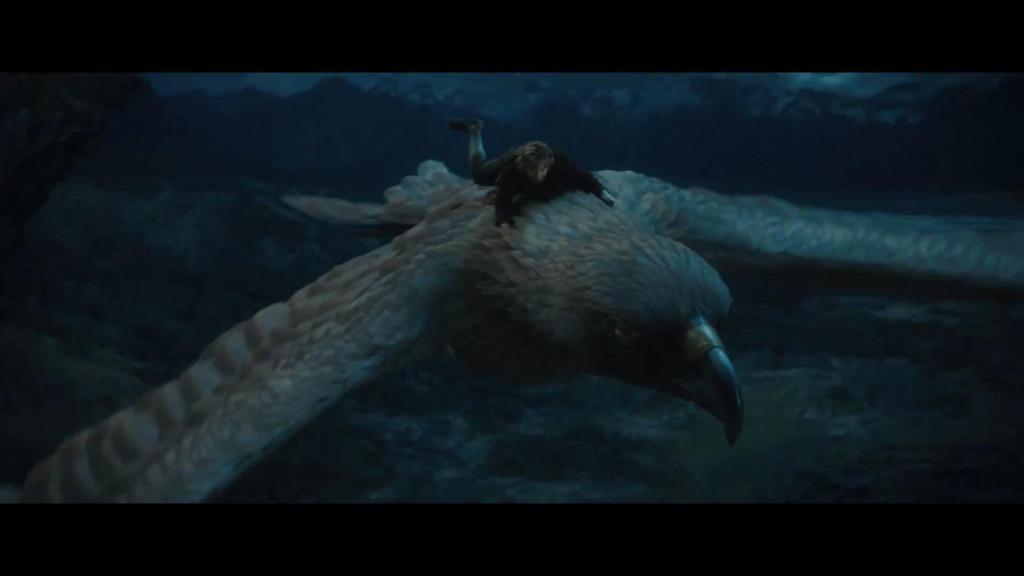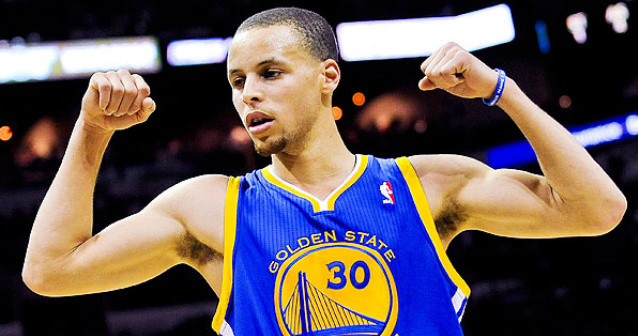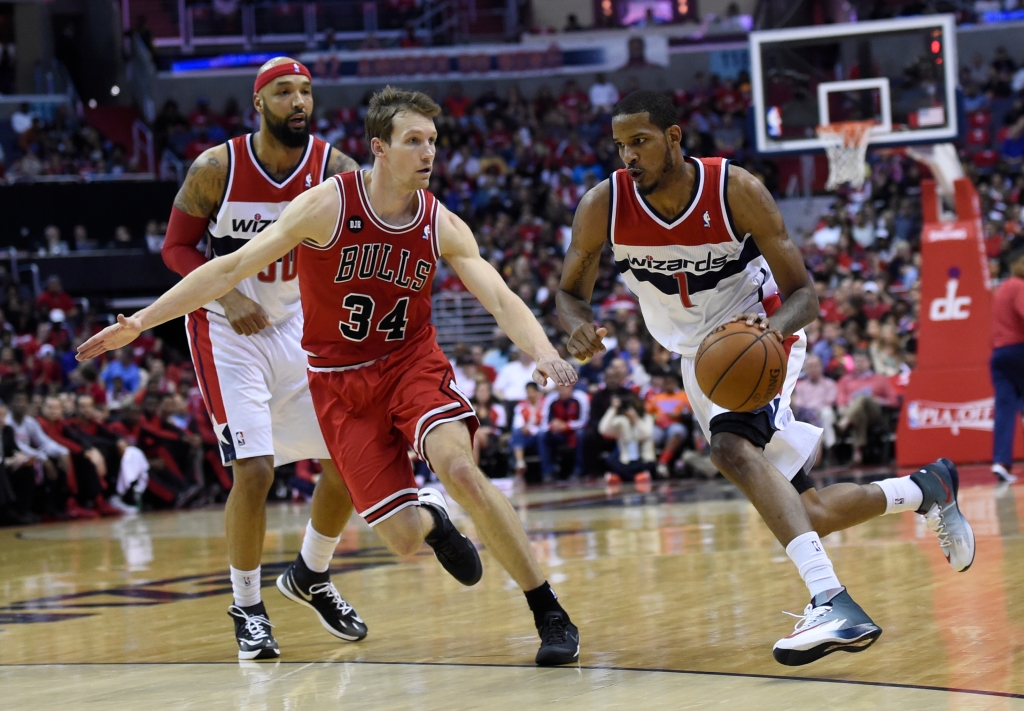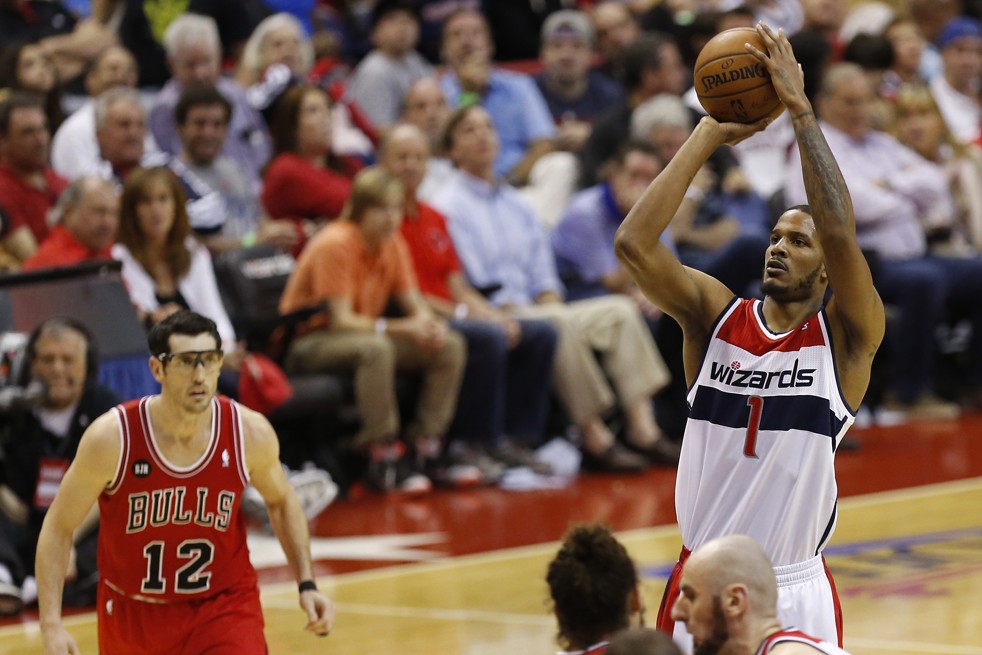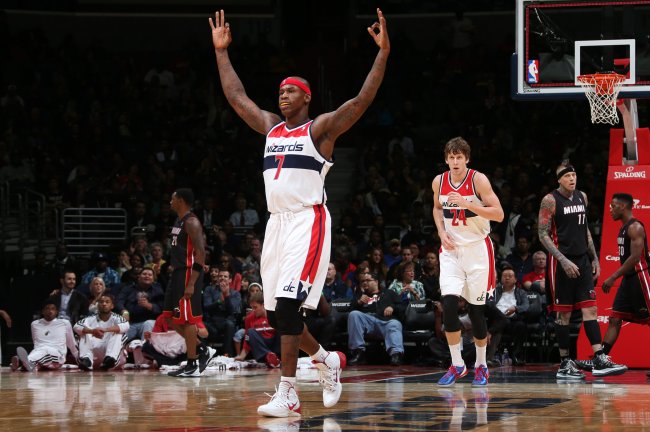Just numbers because…no time. This is through games played on May 10, 2015.
Player Production Average (PPA) is an overall rating stat I developed that credits players for things they do that help a team win and debits them for things that hurt the cause. PPA is pace neutral, accounts for defense, and includes a “degree of difficulty” factor based on the level of competition a player faces while on the floor. In PPA, 100 = average, higher is better and replacement level is 45.
| Player | POS | Tm | G | MPG | PPA |
| DeMarre Carroll | SF | ATL | 9 | 35.2 | 212 |
| Al Horford | C | ATL | 9 | 32.2 | 182 |
| Paul Millsap | PF | ATL | 9 | 35.7 | 174 |
| Kyle Korver | SG | ATL | 9 | 38.2 | 147 |
| Jeff Teague | PG | ATL | 9 | 32.1 | 108 |
| Shelvin Mack | PG | ATL | 7 | 4.9 | 96 |
| Mike Scott | PF | ATL | 8 | 11.1 | 83 |
| Mike Muscala | PF | ATL | 3 | 8.0 | 66 |
| Dennis Schroder | PG | ATL | 9 | 17.9 | 63 |
| Pero Antic | PF | ATL | 9 | 16.7 | 34 |
| Kent Bazemore | SG | ATL | 9 | 17.7 | 32 |
| John Jenkins | SG | ATL | 2 | 2.5 | -85 |
| Elton Brand | PF | ATL | 2 | 2.0 | -212 |
| Jae Crowder | SF | BOS | 4 | 25.0 | 126 |
| Jared Sullinger | PF | BOS | 4 | 20.0 | 110 |
| Tyler Zeller | C | BOS | 4 | 22.5 | 85 |
| Isaiah Thomas | PG | BOS | 4 | 29.8 | 67 |
| Marcus Smart | PG | BOS | 4 | 22.5 | 57 |
| Evan Turner | SG | BOS | 4 | 29.5 | 50 |
| Brandon Bass | PF | BOS | 4 | 21.5 | 49 |
| Avery Bradley | SG | BOS | 4 | 33.3 | 23 |
| Kelly Olynyk | C | BOS | 4 | 13.3 | 20 |
| Jonas Jerebko | PF | BOS | 4 | 17.0 | -13 |
| Gerald Wallace | SF | BOS | 1 | 4.0 | -68 |
| Luigi Datome | SF | BOS | 3 | 4.7 | -87 |
| Phil Pressey | PG | BOS | 2 | 2.5 | -158 |
| Brook Lopez | C | BRK | 6 | 39.0 | 166 |
| Alan Anderson | SG | BRK | 6 | 23.7 | 122 |
| Joe Johnson | SG | BRK | 6 | 41.5 | 103 |
| Jarrett Jack | PG | BRK | 6 | 25.5 | 94 |
| Deron Williams | PG | BRK | 6 | 32.0 | 87 |
| Markel Brown | SG | BRK | 2 | 5.0 | 68 |
| Thaddeus Young | PF | BRK | 6 | 31.7 | 55 |
| Bojan Bogdanovic | SF | BRK | 6 | 34.3 | 48 |
| Mason Plumlee | C | BRK | 6 | 8.2 | 30 |
| Earl Clark | PF | BRK | 2 | 6.5 | -47 |
| Darius Morris | PG | BRK | 1 | 5.0 | -84 |
| Mirza Teletovic | PF | BRK | 3 | 5.3 | -115 |
| Jerome Jordan | C | BRK | 1 | 5.0 | -168 |
| Jimmy Butler | SG | CHI | 10 | 42.2 | 195 |
| Pau Gasol | PF | CHI | 9 | 32.6 | 191 |
| Nazr Mohammed | C | CHI | 2 | 5.5 | 155 |
| Mike Dunleavy | SF | CHI | 10 | 32.1 | 137 |
| Derrick Rose | PG | CHI | 10 | 37.6 | 123 |
| Joakim Noah | C | CHI | 10 | 31.9 | 120 |
| Doug McDermott | SF | CHI | 2 | 3.5 | 119 |
| Taj Gibson | PF | CHI | 10 | 23.5 | 117 |
| Kirk Hinrich | SG | CHI | 8 | 10.4 | 89 |
| Nikola Mirotic | PF | CHI | 9 | 14.7 | 10 |
| Tony Snell | SF | CHI | 9 | 14.4 | 7 |
| E’Twaun Moore | SG | CHI | 2 | 3.0 | -5 |
| Aaron Brooks | PG | CHI | 10 | 11.5 | -14 |
| Kevin Love | PF | CLE | 4 | 26.8 | 165 |
| Timofey Mozgov | C | CLE | 8 | 25.5 | 152 |
| Kyrie Irving | PG | CLE | 8 | 40.0 | 143 |
| Tristan Thompson | PF | CLE | 8 | 30.6 | 141 |
| LeBron James | SF | CLE | 8 | 41.9 | 120 |
| Iman Shumpert | SG | CLE | 8 | 31.9 | 113 |
| J.R. Smith | SG | CLE | 6 | 26.7 | 107 |
| Mike Miller | SF | CLE | 2 | 14.5 | 84 |
| Shawn Marion | SF | CLE | 3 | 4.0 | 48 |
| James Jones | SF | CLE | 8 | 12.6 | 28 |
| Matthew Dellavedova | SG | CLE | 8 | 16.3 | 20 |
| Kendrick Perkins | C | CLE | 4 | 5.0 | -4 |
| Joe Harris | SG | CLE | 1 | 2.0 | -217 |
| Al-Farouq Aminu | SF | DAL | 5 | 30.0 | 177 |
| Tyson Chandler | C | DAL | 5 | 32.0 | 161 |
| Charlie Villanueva | PF | DAL | 5 | 8.6 | 135 |
| Monta Ellis | SG | DAL | 5 | 39.4 | 111 |
| Dirk Nowitzki | PF | DAL | 5 | 36.2 | 109 |
| Jose Barea | PG | DAL | 5 | 30.8 | 68 |
| Raymond Felton | PG | DAL | 3 | 12.0 | 18 |
| Rajon Rondo | PG | DAL | 2 | 18.5 | 15 |
| Bernard James | C | DAL | 1 | 2.0 | 0 |
| Greg Smith | PF | DAL | 1 | 1.0 | 0 |
| Amar’e Stoudemire | PF | DAL | 5 | 15.0 | -3 |
| Devin Harris | PG | DAL | 4 | 18.5 | -14 |
| Richard Jefferson | SF | DAL | 4 | 12.8 | -30 |
| Chandler Parsons | SF | DAL | 1 | 37.0 | -33 |
| Dwight Powell | PF | DAL | 2 | 1.5 | -81 |
| Stephen Curry | PG | GSW | 7 | 39.6 | 179 |
| Andrew Bogut | C | GSW | 7 | 25.9 | 159 |
| Harrison Barnes | SF | GSW | 7 | 32.3 | 151 |
| Draymond Green | SF | GSW | 7 | 38.7 | 149 |
| Klay Thompson | SG | GSW | 7 | 37.1 | 130 |
| Festus Ezeli | C | GSW | 7 | 6.3 | 55 |
| Andre Iguodala | SG | GSW | 7 | 28.0 | 53 |
| Shaun Livingston | PG | GSW | 7 | 14.4 | 49 |
| Leandro Barbosa | SG | GSW | 7 | 12.6 | 35 |
| Marreese Speights | PF | GSW | 7 | 7.3 | 21 |
| Justin Holiday | SG | GSW | 1 | 1.0 | 0 |
| David Lee | PF | GSW | 2 | 4.5 | -106 |
| James Michael McAdoo | PF | GSW | 1 | 1.0 | -285 |
| James Harden | SG | HOU | 9 | 35.7 | 190 |
| Dwight Howard | C | HOU | 9 | 32.7 | 167 |
| Jason Terry | SG | HOU | 9 | 26.8 | 95 |
| Clint Capela | C | HOU | 9 | 7.8 | 82 |
| Terrence Jones | PF | HOU | 9 | 24.4 | 78 |
| Trevor Ariza | SF | HOU | 9 | 37.4 | 64 |
| Josh Smith | PF | HOU | 9 | 22.2 | 61 |
| Pablo Prigioni | PG | HOU | 9 | 20.7 | 34 |
| Corey Brewer | SF | HOU | 9 | 26.0 | 15 |
| Nick Johnson | SG | HOU | 5 | 5.6 | -7 |
| Joey Dorsey | PF | HOU | 5 | 2.4 | -36 |
| Kostas Papanikolaou | SF | HOU | 5 | 3.0 | -199 |
| Chris Paul | PG | LAC | 9 | 36.0 | 230 |
| DeAndre Jordan | C | LAC | 11 | 34.3 | 193 |
| Blake Griffin | PF | LAC | 11 | 39.4 | 193 |
| Spencer Hawes | PF | LAC | 5 | 6.2 | 102 |
| Austin Rivers | PG | LAC | 11 | 18.3 | 90 |
| Matt Barnes | SF | LAC | 11 | 30.3 | 90 |
| Dahntay Jones | SF | LAC | 9 | 1.7 | 87 |
| J.J. Redick | SG | LAC | 11 | 38.7 | 81 |
| Jamal Crawford | SG | LAC | 11 | 27.5 | 41 |
| Lester Hudson | SG | LAC | 5 | 6.8 | 31 |
| Glen Davis | PF | LAC | 11 | 11.5 | 1 |
| Hedo Turkoglu | SF | LAC | 10 | 5.1 | -23 |
| Ekpe Udoh | PF | LAC | 4 | 3.0 | -57 |
| Jordan Adams | SG | MEM | 2 | 1.0 | 853 |
| Russ Smith | PG | MEM | 1 | 1.0 | 284 |
| Mike Conley | PG | MEM | 5 | 27.8 | 192 |
| Marc Gasol | C | MEM | 8 | 37.1 | 172 |
| Courtney Lee | SG | MEM | 8 | 33.5 | 161 |
| Tony Allen | SG | MEM | 8 | 32.1 | 151 |
| Kosta Koufos | C | MEM | 8 | 11.8 | 141 |
| Beno Udrih | PG | MEM | 7 | 19.6 | 92 |
| Vince Carter | SG | MEM | 8 | 15.8 | 73 |
| JaMychal Green | PF | MEM | 2 | 1.0 | 69 |
| Zach Randolph | PF | MEM | 8 | 35.5 | 66 |
| Nick Calathes | SG | MEM | 6 | 17.3 | 18 |
| Jeff Green | SF | MEM | 8 | 25.6 | 7 |
| Jon Leuer | PF | MEM | 2 | 2.0 | -37 |
| Zaza Pachulia | C | MIL | 6 | 21.5 | 140 |
| Jared Dudley | SG | MIL | 6 | 18.3 | 122 |
| John Henson | C | MIL | 6 | 25.5 | 118 |
| Khris Middleton | PF | MIL | 6 | 38.7 | 88 |
| Jerryd Bayless | PG | MIL | 6 | 20.0 | 53 |
| Tyler Ennis | PG | MIL | 1 | 16.0 | 47 |
| Giannis Antetokounmpo | SG | MIL | 6 | 33.5 | 47 |
| Michael Carter-Williams | PG | MIL | 6 | 31.8 | 43 |
| O.J. Mayo | SG | MIL | 6 | 26.0 | 41 |
| Jorge Gutierrez | PG | MIL | 1 | 12.0 | 24 |
| Ersan Ilyasova | PF | MIL | 6 | 23.7 | 21 |
| Johnny O’Bryant | PF | MIL | 1 | 12.0 | -3 |
| Miles Plumlee | C | MIL | 1 | 16.0 | -66 |
| Alexis Ajinca | C | NOP | 3 | 3.3 | 244 |
| Anthony Davis | PF | NOP | 4 | 43.0 | 198 |
| Dante Cunningham | PF | NOP | 4 | 18.8 | 143 |
| Quincy Pondexter | SF | NOP | 4 | 31.0 | 95 |
| Omer Asik | C | NOP | 4 | 19.8 | 91 |
| Eric Gordon | SG | NOP | 4 | 35.8 | 85 |
| Ryan Anderson | PF | NOP | 4 | 23.8 | 81 |
| Jrue Holiday | PG | NOP | 3 | 18.3 | 58 |
| Tyreke Evans | SF | NOP | 4 | 31.3 | 49 |
| Norris Cole | PG | NOP | 4 | 26.5 | -39 |
| Allen Crabbe | SG | POR | 2 | 19.5 | 150 |
| Meyers Leonard | C | POR | 5 | 21.2 | 144 |
| Alonzo Gee | SF | POR | 1 | 3.0 | 133 |
| Joel Freeland | C | POR | 2 | 3.5 | 96 |
| C.J. McCollum | SG | POR | 5 | 33.2 | 93 |
| Robin Lopez | C | POR | 5 | 23.4 | 89 |
| LaMarcus Aldridge | PF | POR | 5 | 41.6 | 79 |
| Nicolas Batum | SF | POR | 5 | 41.8 | 66 |
| Chris Kaman | C | POR | 3 | 12.3 | 56 |
| Damian Lillard | PG | POR | 5 | 40.2 | 54 |
| Steve Blake | PG | POR | 5 | 8.6 | -26 |
| Arron Afflalo | SG | POR | 3 | 20.0 | -130 |
| Tim Frazier | PG | POR | 2 | 1.5 | -312 |
| Tim Duncan | PF | SAS | 7 | 35.7 | 213 |
| Kawhi Leonard | SF | SAS | 7 | 35.7 | 154 |
| Patrick Mills | PG | SAS | 7 | 16.0 | 154 |
| Marco Belinelli | SG | SAS | 7 | 16.6 | 136 |
| Boris Diaw | PF | SAS | 7 | 28.3 | 96 |
| Danny Green | SG | SAS | 7 | 29.1 | 86 |
| Manu Ginobili | SG | SAS | 7 | 18.7 | 80 |
| Cory Joseph | PG | SAS | 4 | 5.5 | 77 |
| Jeff Ayres | PF | SAS | 3 | 4.0 | 43 |
| Tiago Splitter | C | SAS | 7 | 17.6 | 23 |
| Tony Parker | PG | SAS | 7 | 30.0 | -18 |
| Aron Baynes | C | SAS | 4 | 10.0 | -52 |
| Matt Bonner | PF | SAS | 7 | 5.1 | -70 |
| Greg Stiemsma | C | TOR | 1 | 2.0 | 530 |
| Jonas Valanciunas | C | TOR | 4 | 26.5 | 141 |
| Patrick Patterson | PF | TOR | 4 | 26.5 | 121 |
| Amir Johnson | PF | TOR | 4 | 28.0 | 90 |
| DeMar DeRozan | SG | TOR | 4 | 39.8 | 74 |
| Terrence Ross | SF | TOR | 4 | 26.8 | 38 |
| Lou Williams | SG | TOR | 4 | 25.5 | 26 |
| Greivis Vasquez | PG | TOR | 4 | 25.3 | 14 |
| Kyle Lowry | PG | TOR | 4 | 32.8 | -6 |
| Tyler Hansbrough | PF | TOR | 4 | 12.0 | -13 |
| James Johnson | PF | TOR | 2 | 6.0 | -117 |
| Marcin Gortat | C | WAS | 7 | 32.6 | 227 |
| John Wall | PG | WAS | 5 | 38.2 | 175 |
| Paul Pierce | SF | WAS | 7 | 29.4 | 160 |
| Otto Porter | SF | WAS | 7 | 33.3 | 153 |
| Kris Humphries | PF | WAS | 1 | 5.0 | 140 |
| Bradley Beal | SG | WAS | 7 | 41.3 | 109 |
| Drew Gooden | PF | WAS | 7 | 18.3 | 101 |
| Ramon Sessions | PG | WAS | 7 | 22.6 | 62 |
| Nene Hilario | PF | WAS | 7 | 24.6 | 54 |
| Will Bynum | SG | WAS | 2 | 8.5 | 35 |
| Martell Webster | SF | WAS | 1 | 4.0 | 34 |
| Kevin Seraphin | C | WAS | 5 | 8.8 | -19 |
| Garrett Temple | SG | WAS | 2 | 11.0 | -46 |
| Rasual Butler | SF | WAS | 2 | 3.5 | -82 |


